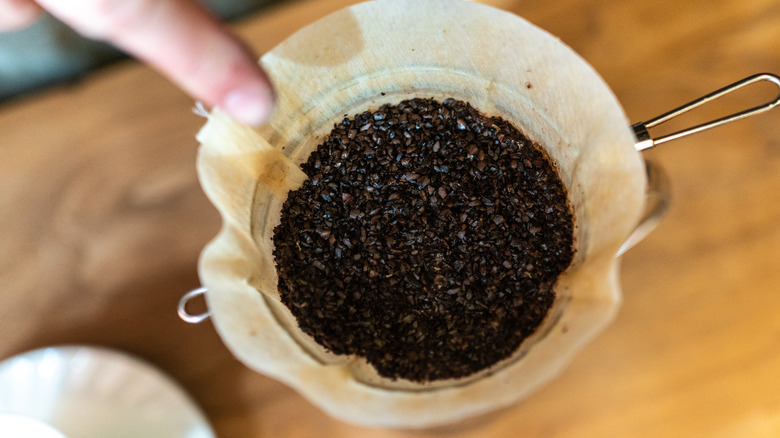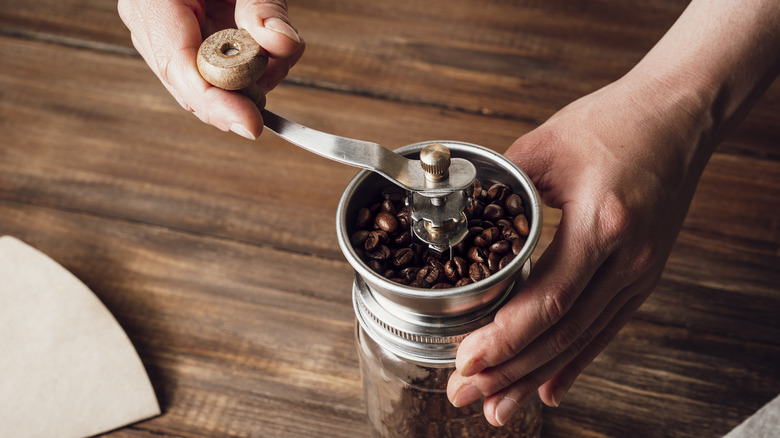The Unappetizing Reason You Might Want To Stop Buying Ground Coffee
We may receive a commission on purchases made from links.
If you're a coffee lover, you may want to brace yourself for this unsettling truth. Your beloved ground coffee might be hiding a dark secret that could make you think twice before purchasing it again. Many brands often contain fillers that degrade the quality of your brew.
It may come as a shock to some, but the practice of cutting coffee with cheaper ingredients isn't a new phenomenon. In a 2014 interview, Dr. Suzana Lucy Nixdorf of the State University of Londrina in Brazil told Women's Health that this happens a lot when there are coffee shortages, and suppliers have to find unique ways to boost profits. How does this slide past food regulatory groups? Nixdorf says it's because it's nearly impossible to distinguish what's what after the beans are roasted and ground.
So, what's a coffee lover to do? The answer is simple: Buy whole-bean coffee and grind it yourself. Risk of adulteration isn't the only unappetizing reason why you might want to stop buying ground coffee, though. From the degradation of flavor to the risk of contamination, let's dive into the many reasons why buying whole beans is the way to go.
Uncovering the real ingredients in ground coffee
According to 2014 research presented at a meeting of the American Chemical Society, many commercial ground coffee blends are packed with unexpected ingredients, including twigs, barley, and even dirt. Yes, you read that right: There could be dirt in your coffee. In his 2016 book "Real Food/Fake Food: Why You Don't Know What You're Eating and What You Can Do About It," author Larry Olmsted confirmed that researchers have found everything from parchment to corn in coffee. However, Olmsted went on to add the practice is a lot more common in powdered instant coffee.
What's particularly concerning is that the U.S. has some of the most relaxed regulations around what can and can't go into coffee. In fact, it has "some of the lowest mold standards in the world" according to Women's Health. Dave Asprey, author of "The Bulletproof Diet," called out American coffee as not even being good enough to sell to consumers in European markets. This means coffee lovers are often none the wiser about what they're drinking.
While buying whole-bean coffee doesn't protect against all food dangers, it's a great way to ensure your brew hasn't been cut with anything unsettling. And sure, grinding your own coffee may require a bit more effort, but the results are worth it. To get started, invest in a good coffee grinder and aim for a consistency that's similar to coarse sea salt. And be sure to grind only what you need — there's good reason for this.
Reasons to grind your own coffee
If you're looking for the freshest, most flavorful coffee possible, there are some other compelling arguments for grinding your own coffee beans aside from avoiding unwanted particles of twigs and dirt. One of the main advantages is the level of control you gain over the brewing process. When you buy pre-ground coffee, you're getting a product that may have been exposed to air, moisture, and light, which can all rob coffee of its peak flavor.
Coffee beans start to lose flavor as soon as they're roasted, and that process accelerates once they're ground. Summer Zhang, a roaster and quality control expert at Onyx Coffee Lab, explained the science behind why to HuffPost. "Freshly grinding whole bean coffee is better than drinking ground because the aromatic molecules will volatilize after grinding, and the exposed surface area of coffee increases significantly, resulting in faster oxidation," she said. This affects the taste and ultimately leads to a loss of flavor.
Finally, grinding your own beans allows you the option to experiment with different types of grinds to suit your brewing method. Whether you prefer French press, drip coffee, or espresso, grinding your own beans ensures a more satisfying cup of coffee each time. So, while buying pre-ground coffee may be more convenient, the benefits of grinding your own beans far outweigh any added effort required.


